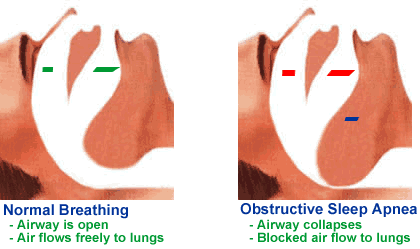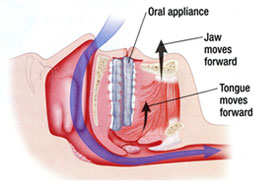Sleep Apnea/Snoring

What is Sleep Apnea?
Sleep Apnea is a sleep disorder marked by pauses in breathing occurring one or more times during sleep, or breathing during sleep is abnormally low. This is a chronic condition that is disruptive to normal sleep, causing an immediate deficiency in oxygen reaching the brain and the body. Each pause in breath is called an apneic episode, and may last from a few seconds to a few minutes throughout your sleep. Alarmingly, anywhere from 5 to 30 pauses may occur in a single hour, every hour you are asleep. After these occurrences, breathing typically resumes, sounding much like a choke or a loud snort. Since sleep apnea only occurs during sleep it commonly goes undiagnosed. A family member and/or bed partner may be the only ones who notice the first symptoms or signs of the disorder.What is the most common type of Sleep Apnea?
 Sleep apnea may be one of three forms: obstructive apnea, central apnea, or mixed. We most commonly see the obstructive form of this condition, which we can normally treat with a comfortable, customized dental appliance. Obstructive sleep apnea is caused by a blockage of the airway. This means that the airway has collapsed or is blocked during sleep when soft tissue surrounding the air pipe relaxes fully.
Sleep apnea may be one of three forms: obstructive apnea, central apnea, or mixed. We most commonly see the obstructive form of this condition, which we can normally treat with a comfortable, customized dental appliance. Obstructive sleep apnea is caused by a blockage of the airway. This means that the airway has collapsed or is blocked during sleep when soft tissue surrounding the air pipe relaxes fully.
What are the Effects of Sleep Apnea?
Loud snoring is common with sleep apnea due to air trying to squeeze past the blockage while breathing. This is most common in people who are overweight, but can affect anyone. Even children with enlarged tonsils can suffer from this disorder.If sleep apnea goes untreated there is an increased risk for serious health conditions such as:
- High blood pressure and other cardiovascular disease
- Stroke
- Headaches
- Weight gain
- Diabetes
- Depression
- Memory problems
- Worsening of ADHD
Additionally, untreated sleep apnea may factor into:
- Poor performance with everyday activities
- Hinder job function
- Cause academic underachievement in adolescents
- Impaired judgment resulting in motor vehicle accidents
- Exhaustion/Fatigue
How can a Dental Appliance treat Sleep Apnea?

Dental appliances provide a viable solution for mild to moderate cases of obstructive sleep apnea. It is also a solution for those who are CPAP intolerant. It is reported that a dental appliance is successful in as much as 75% for this type of diagnosis. A dental appliance, which can help you avoid surgical treatment, is designed to maintain the palate in an upward position, and to hold the tongue and jaw in a forward position, thus maintaining proper airflow through an open airway. Increasing the passageway through which air can flow is often enough to decrease the pauses in breath during sleep. A dental appliance, worn nightly, is compact and comfortable, unlike a CPAP machine.
Patient Reviews
"They explained everything that was being done in a professional manner."
Anderson
Anderson